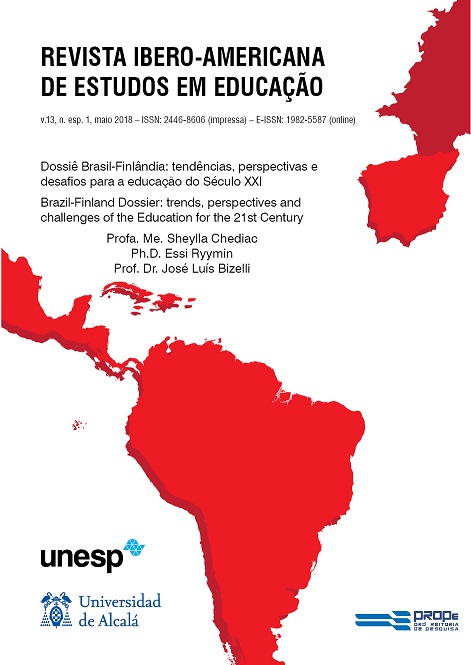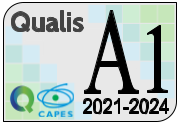A importância da avaliação por pares e auto avaliação em ABP Aplicada a um curso de administração
DOI:
https://doi.org/10.21723/riaee.nesp1.v13.2018.10347Palavras-chave:
Métodos de avaliação. PBL. Aprendizagem em administração. Modelos de aprendizagem.Resumo
A aprendizagem baseada em projetos (PBL) é uma metodologia de aprendizagem ativa que coloca o aluno no centro da aprendizagem, forçando o professor a assumir um papel de facilitador e coadjuvante. Esta nova postura docente não é menos importante, porque exige muitas mudanças que devem ser promovidas por estes, em particular, relacionadas à coordenação e à organização do projeto de aprendizagem. Uma tarefa importante neste planejamento está relacionada ao método de avaliação, que deve estimular o comportamento discente que promova sua motivação à aprendizagem. Esta foi a preocupação em um programa de graduação em Administração de uma instituição privada na cidade de Campos dos Goytacazes, no Brasil. Esta metodologia exigiu mudanças substanciais nos métodos de ensino/aprendizagem, assim como abordagens de avaliação focadas na presente pesquisa. Este artigo apresenta uma visão geral dos conceitos PBL e da metodologia de avaliação adotada para esse curso específico. Além disso, discute os resultados do novo método de avaliação. Esta foi uma experiência inovadora que confirmou os resultados positivos da experiência PBL dos alunos e também a importância da avaliação por pares nesta metodologia de aprendizagem.
Downloads
Referências
ALVES, A. C.; MOREIRA, F.; LIMA, R.; SOUSA, R.; DINIS-CARVALHO, J.; MESQUITA, D.; FERNANDES, S.; VAN HATTUM-JANSSEM, N. Project-Based Learning in first year, first semester of industrial engineering and management: some results. Proceedings of the ASME 2012 International Mechanical Engineering Congress & Exposition, Texas, (IMECE2012), november 9-15, Houston, Texas, USA. V. 5, p. 111-120, 2012. Disponível em: http://www.scopus.com/inward/record.url?eid=2-s2.0-84887307630&partnerID=MN8TOARS. Acesso em: 10 maio 2018.
ALVES, A. C.; MOREIRA, F.; CARVALHO, M. A.; OLIVEIRA, S.; MALHEIRO, T.; BRITO, I.; LEÃO, C. P.; TEIXEIRA, S. Iegrating science, technology, engineering and mathematics contents through pbl methodology in industrial engineering and management first year program. European Journal of Engineering Education, CEEE-2017-0072, 2017.
ALVES, A. C.; MOREIRA, F.; LEÃO, C. L. Peer assessment in PBL: does gender matter? In: 23rd ICE Conference – IEEE ITMC International Conference, “Engineering, Technology & Innovation Management Beyond 2020: New Challenges, New Approaches”, Madeira, Portugal, June 27 – 29, 2017, p. 1398-1402, 2017.
ALVES, A. C.; SOUSA, R. M.; MOREIRA, F.; CARVALHO, M. A.; CARDOSO, E.; PIMENTA, P.; FERNANDES, S.; MESQUITA, D. Managing PBL difficulties in an Industrial Engineering and Management program. Journal of Industrial Engineering and Management, v. 8, n. 3, p. 73-89, 2016.
ALVES, A.; SOUSA, A.; FERNANDES, S.; CARDOSO, E.; CARVALHO, M.; FIGUEIREDO, J.; PEREIRA, R. Teacher's experiences in PBL: implications for practice, European Journal of Engineering Education, v. 41, n. 2, p. 123-141, 2015. DOI: 10.1080/03043797.2015.1023782.
ALVES, A. C.; LEÃO, C. P. Action, practice and research in Project-Based Learning in an Industrial Engineering and Management Program. Proceedings of the ASME 2015 International Mechanical Engineering Congress & Exposition (IMECE2015), november 14-20, 2015, Houston, US. Paper n. IMECE2015-51438, p. V005T05A013. ISBN: 978-0-7918-5742-7. DOI:10.1115/IMECE2015-51438.
ALVES, A. C.; MOREIRA, F.; MESQUITA, D.; FERNANDES, S. Teamwork in Project-Based Learning: engineering students’ perceptions of strengths and weaknesses. Proceedings of the Fourth International Symposium on Project Approaches (PAEE), S. Paulo, 26-27 july, 2012. p. 23-32. ISBN 978-989-8525-14-7.
ANDERSSON, C.; PALM, T. The impact of formative assessment on student achievement: a study of the effects of changes to classroom practice after a comprehensive professional development programm. Elsevier: Learning and Instruction, n. 49, p. 92-102, 2015.
ANDRADE, H.; DU, Y. Student responses to criteria-referenced self-Assessment. Assessment and Evaluation in Higher Education, v. 32, n. 2, p. 159-181, 2007.
BELL, S. Project-Based Learning for the 21st Century: Skills for the Future in The Clearing House. A Journal of Educational Strategies, Issues and Ideas, v. 83, n. 2, p. 39-43, 2010.
BIGGS, J.; TANG, C. Teaching for quality learning at university: what the student does. 3rd ed. Society for Research into Higher Education & Open University Press, Maidenhead, 2007.
BLUMENFELD, P. C.; SOLOWAY, E.; MARX, R. W.; KRAJCIK, J. S.; GUZDIAL, M.; PALINCSAR, A. Motivating project-based learning: sustaining the doing, supporting the learning. Educational Psychologist, v. 26, n. 3-4, p. 369-398, 1991.
BLACK, P.; WILIAM, D. Assessment and classroom learning. Assessment in Education: Principles, Policy & Practice, v.5, n. 1, p. 7-74, 1998. DOI: 10.1080/0969595980050102.
BLUMENFELD, P. C.; SOLOWAY, E.; MARX, R. W.; KRAJCIK, J. S.; GUZDIAL, M.; PALINCSAR, A. Motivating project-based learning: Sustaining the doing, supporting the learning. Educational psychologist, v. 26, n. 3-4, p 369-398, 1991.
BOUD, D. Assessment and learning: contradictory or complementary? Assessment for Learning in Higher Education, p. 35-48. London: Kogan. 1995.
BONWELL, C. C.; EISON, J. A. Active learning: creating excitement in the classroom. ASHE-ERIC Higher Education Report. 1991.
CAMPBELL, C. Problem-based learning and project-based learning. Australia: Teacher bulletin, 2014. Disponível em: https://www.teachermagazine.com.au/articles/problem-based-learning-and-project-based-learning. Acesso em: 10 maio 2018.
CHOO, S.; ROTGANS, J.; YEW, E. Effect of worksheet scaffolds on student learning in problem-based learning. Netherlands: Adv Health Sci Educ Theory Pract, Oct; v. 16, n. 4, p. 517–528. 2011.
FALCHIKOV, N. The place of peers in learning and assessment. In: D. BOUD, N. FALCHIKOV (Eds.). Rethinking assessment in higher education: Learning for the longer term. London: Routledge. p. 128-143, 2007.
FRANK, M.; BARZILAI, A. Integrating alternative assessment in a project-based learning course for pre-service science and technology teachers. Assessment & Evaluation in Higher Education, v. 29, n. 1, p 41-61, 2004.
FELDER, R. M.; WOODS, D. R.; STICE, J. E.; RUGARCIA, A. The future of engineering education II: teaching methods that work, Chem. Engr. Education, v. 34, n. 1, p. 26-39, 2000.
FERNANDES, S.; MESQUITA, D.; FLORES, M. A.; LIMA, R. M. Engaging students in learning: Findings from a study of project-led education. European Journal of Engineering Education, v. 39, n. 1, p. 55–67, 2014. DOI: 10.1080/03043797.2013.833170X.
FERNANDES, S.; FLORES, M. A.; LIMA, R. M. Students’ views of assessment in project-led engineering education: findings from a case study in Portugal. Assessment & Evaluation in Higher Education, v. 37, n. 2, p. 163–178, 2012. DOI: 10.1080/02602938.2010.515015X.
HADIM, H. A.; ESCHE, S. K. Enhancing the engineering curriculum through project-based learning. Proceedings of the 32nd ASEE/IEEE Frontiers in Education Conference, Boston, 2002.
HICKMAN, L. A.; NEUBERT, S.; REICH, K. John Dewey between pragmatism and construtivism. New York: Fordham University Press, 2009
HARMER, N. Project-based learning - Literature review. Plymouth University, 2014. Disponível em: https://www.plymouth.ac.uk/uploads/production/document/path/2/2733/Literature_review_Project-based_learning.pdfX. Acesso em: 10 maio 2018.
IACBE. Example of a Business Plan Evaluation Rubric. Kansas: International Assembly for Collegiate Business Education. S. A. Disponível em: http://iacbe.org/pdf/business-plan-rubric.pdf. Acesso em: 10 maio 2018.
JONES, B. F.; RASMUSSEN, C. M.; MOFFITT, M. C. Real-life problem solving: A collaborative approach to interdisciplinary learning. Washington, DC: American Psychological Association, 1997.
KAUFMAN, J. H.; SCHUNN, C. D. Students’ perceptions about peer assessment for writing: their origin and impact on revision work. Pittsburg: University of Pittysburg, 2010. Disponível em: http://www.lrdc.pitt.edu/schunn/research/papers/KaufmanSchunn-StudentPerceptions-.pdf. Acesso em: 10 maio 2018.
KAUFMAN, D. B.; FELDER, R. M. Accounting for individual effort in cooperative teams. Journal of Engineering Education, v. 89, n. 2, p. 133-140, 2000.
KNOLL, M. The Project Method: Its Vocational Education Origin and International Development. Journal of Industrial Teacher Education, v. 34, n. 3, p. 59–80, 1997.
KRAJCIK, J. S.; CZERNIAK, C. M.; BERGER, C. F. Teaching science: a project-based approach, New York: McGraw-Hill College. 1999.
LARMER, J. Project-Based Learning vs. Problem-Based Learning vs. X-BL. Florida: Edutopia, 2015. Disponível em: https://www.edutopia.org/blog/pbl-vs-pbl-vs-xbl-john-larmer. Acesso em: 10 maio 2018.
HARMER, N.; STOKES, A. The benefits and challenges of project-based learning: a review of the literature. Plymouth: PedRIO, 2014.
MOREIRA, F.; RODRIGUES, C.; ALVES, A. C.; MALHEIRO, T.; BRITO, I.; CARVALHO, M. A. Lecturers’ perceptions of a semester-wide interdisciplinary PBL in a master’s degree program in Industrial Engineering and Management. ASME 2017 International Mechanical Engineering Congress and Exposition (IMECE2016), v. 5, Education and Globalization, Tampa, Florida, USA, november 3–9, 2017.
MORGAN, A. Theoretical Aspects of Project-Based Learning in Higher Education. British Journal of Educational Technology, v.14, n. 1, p. 66-78, 1983.
PAUL, M.; OWENCE, C.; CHRISPEN, C.; ALEXANDER, C. R. Peer assessment in Higher education: the roadmap for developing employability skills in potential job seekers. International Journal Educational & Research, v. 1, n. 2, p. 62- 69, 2013.
POWELL, P. Assessment of team-based projects in project-led education. European Journal of Engineering Education, v. 29, n. 2, p. 221-230, 2004. DOI: 10.1080/03043790310001633205.
POWELL, P.; WEENK, W. Project-led Engineering Education. Lemma Publishers, Utrecht. 2003.
RUPP, A.; LEIGHTON, J. P. The Wiley Handbook of Cognition and Assessment: Frameworks, Methodologies and Application. UK: Wiley and Blackwell. 2017.
PUNTAMBEKAR, S.; HÜBSCHER, R. Tools for Scaffolding Students in a Complex Learning Environment: What Have We Gained and What Have We Missed? Educational Psychologist, v. 40, n. 1, p. 1–12, 2005.
RAMSDEN, P. Improving teaching and learning in higher education: the case for a relational perspective. Studies in Higher Education, v. 12, p. 275-286, 1987.
SCRIVEN, M. The methodology of evaluation. In: TYLER, R.W.; GAGNE, R M.; SCRIVEN, M. (Eds.). Perspectives of curriculum evaluation. Chicago, IL: Rand McNally, 1967. p.39-83.
SCRIVEN, M. The methodology of evaluation. Social Science Education Consortium, n. 110, 1966.
SPILLER, D. Assessment Matters: Self-Assessment and Peer Assessment. New Zealand: University of Waikato. 2012.
STAUFFACHER, M.; WALTER, A. I.; LANG, D. J.; WIEK A.; SCHOLZ, R.W. Learning to research environmental problems from a functional socio-cultural constructivism perspective: the transdisciplinary case study approach. International Journal of Sustainability in Higher Education, v.7, n. 3, p. 252-275, 2006.
SHAMSAN, B.; SYED A. T. Evaluation of Problem Based Learning Course at College of Medicine, Qassim University, Saudi Arabia. International Journal of Health Care, v.3, 2009.
THOMAS, J. W. A review of research on project-based-learning. California: Autodesk Foundation. 2000.
THOMAS, J. W.; MERGENDOLLER, J. R.; MICHAELSON, A. Project-based learning: A handbook for middle and high school teachers. Novato, CA: The Buck Institute for Education, 1999.
UEBE MANSUR, A. F. PBL Applied in Entrepreneurship Class: a model from brazilian-finnish case study. ADVED 2016 2nd International Conference on Advances in Education and Social Sciences, p. 195-205, Istanbul, Turkey, 2016.
UEBE MANSUR, A. F. Use of Social Networks and Complexity for Enhancement of Academic Learning in Supervised Internships: an internalization by doing. Nuevas Ideas en Informática Educativa, 2013.
VON KOTZE, A.; COOPER, L. Exploring the transformative potential of project-based learning in university adult education. Studies in the Education of Adults, v. 32, n. 2, p. 212-228, 2000.
Downloads
Publicado
Como Citar
Edição
Seção
Licença
Manuscritos aceitos e publicados são de propriedade dos autores com gestão da Ibero-American Journal of Studies in Education. É proibida a submissão total ou parcial do manuscrito a qualquer outro periódico. A responsabilidade pelo conteúdo dos artigos é exclusiva dos autores. A tradução para outro idioma é proibida sem a permissão por escrito do Editor ouvido pelo Comitê Editorial Científico.








